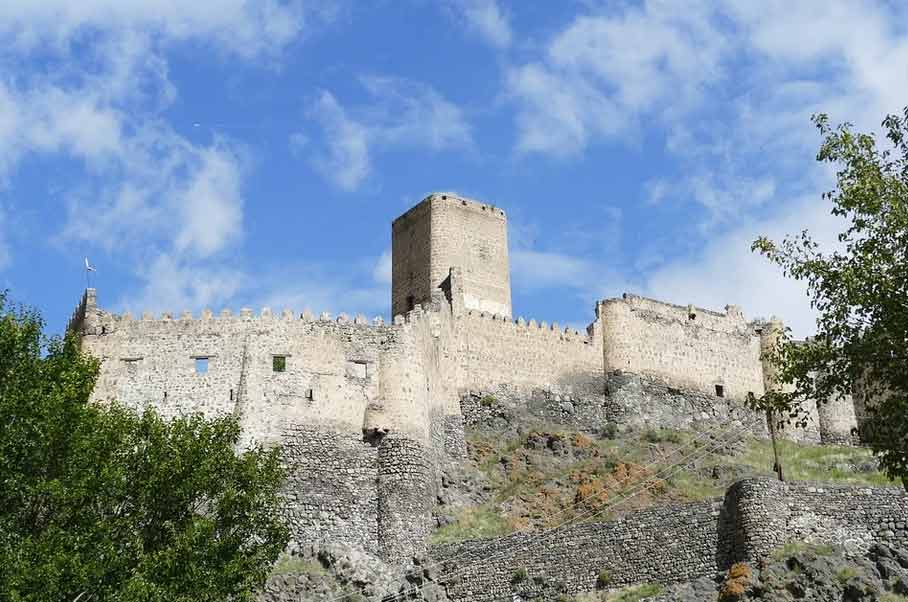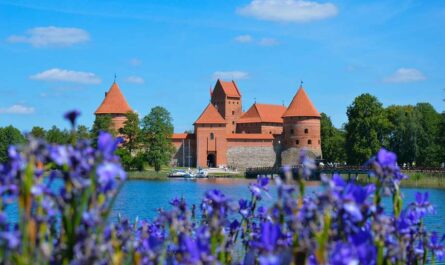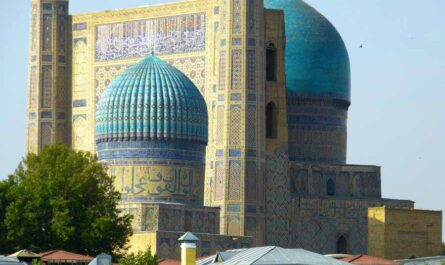There are many interesting facts about Georgia country you will love to know about. In the 19th century, Georgia witnessed a pivotal shift in its political landscape as it transitioned from centuries of Turkish and Persian dominance to becoming part of the Russian Empire. This period marked a significant chapter in Georgia’s history, shaping its trajectory for the years to come. Despite being under Russian control, Georgia retained a degree of autonomy, maintaining its distinct cultural identity amidst the backdrop of imperial expansion.
Interesting facts about Georgia
Despite the euphoria of independence, Georgia faced a period of profound instability and civil upheaval in the 1990s. The collapse of the Soviet Union unleashed a wave of political turmoil, leading to the toppling of the first post-independence administration and the emergence of separatist movements in regions such as South Ossetia and Abkhazia. These internal conflicts threatened to tear the young nation apart, posing formidable challenges to its fledgling democracy and territorial integrity. Yet, amidst the chaos and uncertainty, the people of Georgia demonstrated remarkable resilience and determination, forging ahead on the path toward a brighter and more stable future. Let’s read out the following interesting facts about Georgia country for your fun and learning.
1. Origin of Sakartvelo: The Land of Kartvelians
Sakartvelo, meaning “land of Kartvelians,” is a native Georgian name rooted in the region of Kartli in central Georgia. This term first appeared in historical records during the 9th century and gradually expanded to encompass the entire medieval Kingdom of Georgia by the 13th century. The designation Sakartvelo reflects the deep connection between the Georgian people and their homeland, encapsulating centuries of cultural heritage and national identity.
2. Linguistic Insights: Unraveling the Name Sakartvelo
The name Sakartvelo holds linguistic significance, comprising two components: “Kartvel,” denoting a resident of the Kartli region, and “sa-o,” representing a generic geographical designation meaning “place where the Kartveli live.” While there are various hypotheses surrounding the origin of the English name for Georgia, many trace it back to the Persian and Turkish iterations of the name “George,” such as Gorj and Gurju, which were likely derived from the Russian term “Gruzia.”
3. Musical Transmission to the Cosmos: Chakrulo on the Voyager Spacecraft
A remarkable testament to Georgia’s cultural heritage is the inclusion of Chakrulo, a traditional Georgian folk song, on the Voyager spacecraft’s Golden Record. This recording, transmitted into space alongside 115 analog photographs, natural sounds, and greetings in 59 languages, serves as a poignant representation of humanity’s diversity and creativity. Chakrulo, often sung during festivals and celebrations, symbolizes the enduring spirit of Georgian culture and serves as a universal message of goodwill to any potential extraterrestrial life forms that may encounter the probe. Just like a message in a bottle cast into the cosmic ocean, it carries the essence of humanity’s cultural legacy beyond the bounds of our planet.
4. Linguistic Diversity: Exploring the Georgian Language
Georgian, known as Kartuli ena, stands as the official language of Georgia, reflecting the nation’s rich linguistic heritage. This language encompasses a wide array of dialects, typically categorized into two main groups: East Georgian and West Georgian. Each dialect group contributes to the linguistic tapestry of Georgia, adding depth and complexity to the nation’s cultural identity.
5. UNESCO World Heritage Sites: Preserving Georgia’s Cultural Treasures
Georgia boasts a wealth of cultural and historical landmarks that have been recognized by UNESCO’s World Heritage list. Among these illustrious sites are Mtskheta, an ancient city and former capital of Georgia, the revered Gelati Monastery, and the breathtaking landscapes of Upper Svaneti. While these sites showcase the nation’s remarkable heritage, Georgia continues to nominate additional locations for consideration as future World Heritage Sites, with 15 sites currently on a preliminary list awaiting evaluation.
6. Archaeological Marvels: Uncovering Georgia’s Ancient Past
A groundbreaking archaeological expedition conducted in Dmanisi unearthed a remarkable discovery: the oldest human skulls found in the Caucasus region, dating back approximately 1.8 million years. This extraordinary find suggests that Georgia may harbor one of the world’s oldest human societies, offering profound insights into humanity’s distant past. Among the six skulls discovered, two were affectionately named Zezva and Mzia by Georgian researchers, with artists meticulously reconstructing their appearances, providing a glimpse into the faces of our ancient ancestors. This discovery underscores Georgia’s significance as a cradle of human civilization and highlights the ongoing efforts to unravel the mysteries of our shared history.
7. Safety and Security: Georgia’s Remarkable Transformation
Despite the turmoil experienced during the Russo-Georgian War a decade ago, Georgia has since undergone a remarkable transformation, emerging as a safe and welcoming destination for travelers. In 2017, the International Crime Index ranked Georgia as the seventh safest country globally, underscoring the nation’s commitment to ensuring the safety and security of its residents and visitors alike.
8. Rich Jewish Heritage: Tracing Georgia’s Ancient Jewish Communities
Georgia boasts one of the oldest Jewish communities in the world, with a history spanning over 2,600 years. The presence of Jewish communities in Georgia predates the arrival of Ashkenazi Jews, who migrated to the region following Russian conquests in the 19th century. Today, a significant majority of Georgian Jews reside in Israel, a testament to the large-scale emigration that occurred during the 1990s.
9. Cultural Etiquette: Understanding Georgian Social Norms
Georgians are known for their passionate and expressive nature, often engaging in jovial banter and playful exchanges, which may include the use of swear words in jest. However, it’s crucial to recognize the cultural nuances surrounding language and interaction, particularly when interacting with individuals outside of close, familiar relationships. In Georgian society, women hold a revered position, and it is essential to show utmost respect and refrain from using swear words, especially when addressing a woman. This adherence to cultural norms reflects the patriarchal values deeply ingrained within Georgian society and underscores the importance of cultural sensitivity and understanding when engaging with local communities.
10. Historical Sensitivities: Georgia’s Independence Struggle
In conversations with Georgians, it’s crucial to tread carefully and avoid any suggestion that Georgia is synonymous with or subordinate to Russia. Throughout its tumultuous history, Georgia has endured centuries of subjugation and rule under Russian domination. Despite this oppressive legacy, the Georgian people have steadfastly resisted and fought against oppression, striving to assert their sovereignty and preserve their unique cultural identity. Therefore, it’s essential to approach discussions about Georgia’s relationship with Russia with sensitivity and respect for the country’s long struggle for independence and self-determination.
11. Geographic Misconceptions: Georgia vs. the U.S. State
Georgia’s identity is occasionally muddled with that of the American state of the same name, leading to understandable confusion, particularly in regions where the U.S. state enjoys greater recognition. While Georgians may not react as strongly to this confusion as they would to comparisons with Russia, it’s important to acknowledge this common mistake and strive to avoid it in conversations to prevent any unintended offense or misunderstanding.
12. Delicate Diplomatic Terrain: Russia’s Occupation of Abkhazia and Ossetia
A sensitive topic in Georgian discourse is Russia’s prolonged occupation of the regions of Abkhazia and Ossetia. Given the complex geopolitical dynamics at play, it’s advisable to approach discussions on international relations, particularly those involving Russia’s actions in Georgia, with caution and diplomacy. Recognizing the gravity of the situation and the sensitivities involved, it’s essential to navigate these discussions with tact and sensitivity, mindful of the profound impact of these geopolitical realities on the Georgian people and their aspirations for peace and sovereignty.
13. Viticultural Heritage: Georgia’s Ancient Winemaking Tradition
Georgia holds a prestigious title as the birthplace of winemaking, boasting a legacy that spans over 8,000 years. It was the Georgians who first discovered the transformative power of grape juice when stored in colossal clay vessels known as qvevri and buried underground during the winter months, resulting in the miraculous conversion into wine. This ancient winemaking technique, utilizing qvevri, has earned recognition as a cherished aspect of Georgia’s cultural heritage and has been enshrined on UNESCO’s prestigious list of Intangible Cultural Heritage of Humanity, celebrating the country’s enduring contribution to the world of viticulture.
14. Spiritual Anchorage: Christianity in Georgia
Since the 4th century, Christianity has held sway as the official state religion of Georgia, shaping the nation’s spiritual and cultural landscape. At the helm of Georgia’s Christian faith stands the revered figure of the Catholicos-Patriarch Mtskheta-Tbilisi Ilia II, who serves as the esteemed Head of the Church in Georgia. With a spiritual domain encompassing 5,000 congregations, the Catholicos-Patriarch embodies the spiritual aspirations and convictions of the Georgian people, guiding them on their journey of faith and devotion.
15. Linguistic Distinction: The Georgian Language and Alphabet
The Georgian language stands as a testament to the country’s rich linguistic heritage, distinguished by its unique alphabet and rich linguistic tradition. With its own distinctive alphabet, the Georgian script has evolved over the centuries, encompassing variations such as Asomtavruli, Nuskhuri, and Mkhedruli. Among these, Mkhedruli, the traditional 33-letter script, serves as the primary script used by modern Georgians. However, the Georgian Orthodox Church preserves the ancient scripts of Asomtavruli and Nuskhuri for its sacred texts. Rooted in the Kartvelian dialect, Standard Georgian represents just one of the 14 distinct scripts that comprise the Georgian alphabet, serving as a vibrant testament to Georgia’s linguistic diversity and cultural resilience.
16. Historical Animosity: Georgians’ Aversion to Russian Label
Georgians harbor a profound disdain for being associated with Russians, a sentiment that intensified during the tumultuous five-day conflict between Georgia and Russia in 2008. This brief yet intense period of hostilities further deepened the wedge between the two nations, underscoring the fervent desire of Georgians to assert their distinct national identity and autonomy in the face of external pressures.
17. Linguistic Quirks: The Naming of the Homeland
In a surprising linguistic twist, native Georgians eschew the conventional moniker “Georgia” in favor of the indigenous designation “Saqartvelo.” This linguistic preference reflects a deep-rooted attachment to cultural heritage and a desire to preserve the authenticity of the native language. The etymology of the name “Georgia” remains shrouded in mystery, although one prevailing theory traces its origins to the medieval veneration of St. George, the country’s patron saint, whose name endured as a symbol of national identity over the centuries.

18. Ancient Capitals: Mtskheta and Kutaisi
The historical significance of Mtskheta and Kutaisi transcends the boundaries of time and geography, positioning them as veritable cradles of European civilization. Kutaisi, serving as the capital of the United Kingdom of Georgia from 1008 to 1122 CE, boasts a rich legacy of sovereignty and cultural prominence. Similarly, Mtskheta holds a place of honor as the capital of the early Georgian Kingdom of Iberia and the sacred site of Georgia’s conversion to Christianity in 326 CE, symbolizing the enduring spiritual and cultural heritage of the Georgian people.
19. Preserving Cultural Heritage: The Unique Linguistic Landscape of Georgia
Georgian is a language with a rich tapestry of dialects, each reflecting the unique cultural heritage of its region. What sets Georgians apart is its distinct alphabet, which dates back to the mid-4th century, mirroring the country’s ancient roots. While mastering Georgian may pose a challenge, many young Georgians are proficient in English, offering a bridge for communication with visitors from around the globe.
20. Culinary Delights: Exploring the Rich Flavors of Georgian Cuisine
Embark on a culinary adventure through the flavors of Georgia, where traditional dishes are celebrated for their depth of flavor and cultural significance. From the hearty comfort of khinkali (Georgian dumplings) to the savory delights of badrijani nigvzit (eggplant rolls) and the aromatic spices of chakapuli, Georgian cuisine offers a tantalizing array of tastes to savor. Whether indulging in classics like lobio (bean soup) and qababi (kebabs) or exploring lesser-known gems like dolmas and satsivi, every dish tells a story of Georgia’s rich culinary heritage.
21. Vardzia: A Glimpse into Georgia’s Storied Past
Discover the awe-inspiring fortress-monastery-palace complex of Vardzia, a testament to Georgia’s architectural prowess and enduring spirit. Built into and beneath the Erusheti Mountain in the south, Vardzia was commissioned by Queen Tamar in the 13th century as a refuge from the Mongol Empire’s raids. With its remarkable 13 floors, 6000 rooms, and self-sustaining infrastructure, Vardzia stood as a symbol of Georgian resilience and ingenuity. Although ravaged by an earthquake centuries later, Vardzia remains a testament to Georgia’s rich history and cultural heritage, offering visitors a glimpse into the country’s storied past.
22. Centuries of Subjugation: Georgia’s Struggle for Independence
Throughout the nineteenth century, Georgia found itself under the dominion of Russia, enduring a protracted period of subjugation and political upheaval. The quest for autonomy and self-determination remained elusive for much of this tumultuous era, with Georgia only achieving independence from the Soviet Union in relatively recent times. This protracted struggle for freedom underscores the resilience and determination of the Georgian people in the face of external pressures and imperial ambitions. How AI, ChatGPT maximizes earnings of many people in minutes
23. Drinking Culture: A Social Imperative
In Georgian social gatherings, the act of drinking holds profound cultural significance, permeating every aspect of communal interaction. Whether it’s a casual gathering, a celebratory occasion, or a formal dinner, wine and spirited revelry are ubiquitous features of the Georgian social landscape. To decline alcohol in such settings is often met with bewilderment and incredulity, as Georgians hold a deep-seated belief in the conviviality and camaraderie fostered by shared libations. Diplomacy and moderation are key strategies for navigating these social customs, allowing visitors to partake in the festivities while respecting personal preferences.
24. Resilience and Pride: Georgia’s Enduring Spirit
Despite enduring centuries of geopolitical turmoil and foreign domination, Georgians possess an unwavering sense of pride and resilience in their cultural heritage and national identity. This indomitable spirit is evident in their warm hospitality, vibrant culinary traditions, and fervent appreciation for the rich tapestry of Georgian wine culture. As ambassadors of their country’s storied legacy, Georgians exude a palpable sense of pride and enthusiasm, welcoming visitors with open arms and inviting them to partake in the timeless traditions of Georgian hospitality.
Hopefully, you have enjoyed these interesting facts about Georgia country!
More Interesting Facts and Articles
- 60 Interesting Facts about Kathmandu City Nepal
- 30 Interesting Facts About the Flag Of Scotland
- 15 Interesting Fun Facts – Everland Theme Park, South Korea
- 75 Awesome Washington DC USA Interesting Fun Facts
- 70 Archipelago Ibiza Spain Interesting Fun Facts Trivia
- 33 Gyeongbokgung Palace South Korea Interesting Fun Facts
- 29 Andaman and Nicobar Islands Interesting Fun Facts
- 40 Irish Saint Patrick’s Day Interesting Fun Facts
- 25 Interesting Fun Facts About Nami Island South Korea
- 89 Wonders of the World One Must See in Lifetime
- Cultural Wonders of the World – A Complete List
- 22 Pashupatinath Temple Nepal Interesting Fun Facts
- List of 54 Greatest Empires in Entire History Timeline
- 100 United Nations Facts – The UN Basic Facts for All
- 100 Plateau of Tibet Facts to Astonish You
- 200 Kazakhstan Fun Facts Everyone Should Know
- 125 Interesting Facts about Hungary You Must Enjoy
- 200 Interesting Facts about Poland for Travelers
- 200 Cool Facts about Germany to Surprise You



